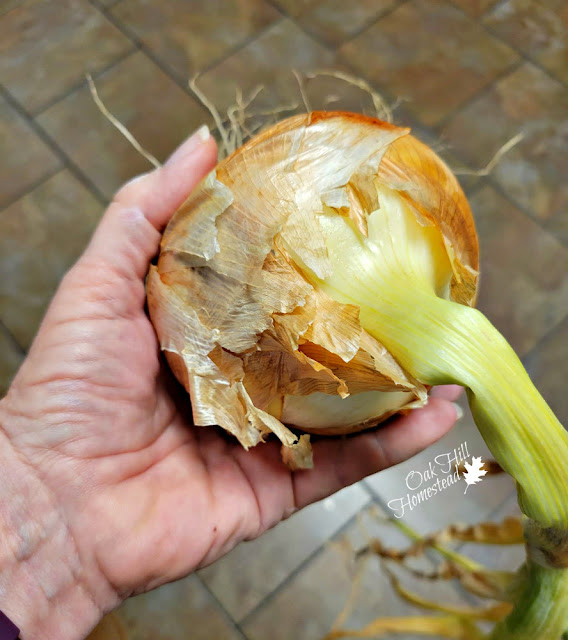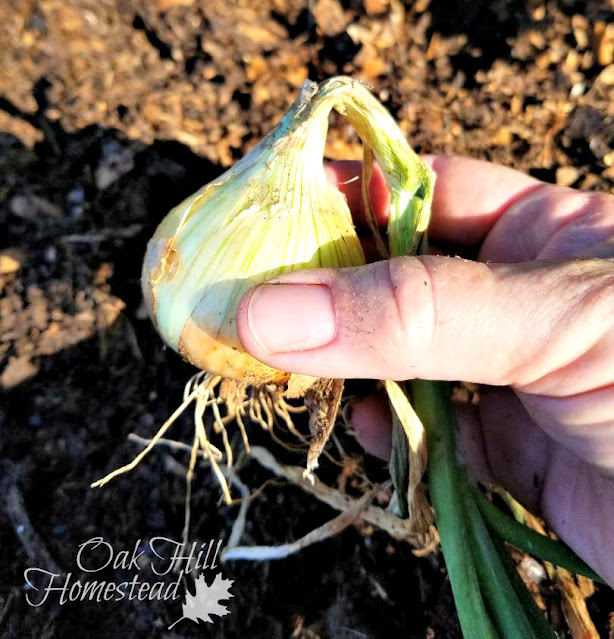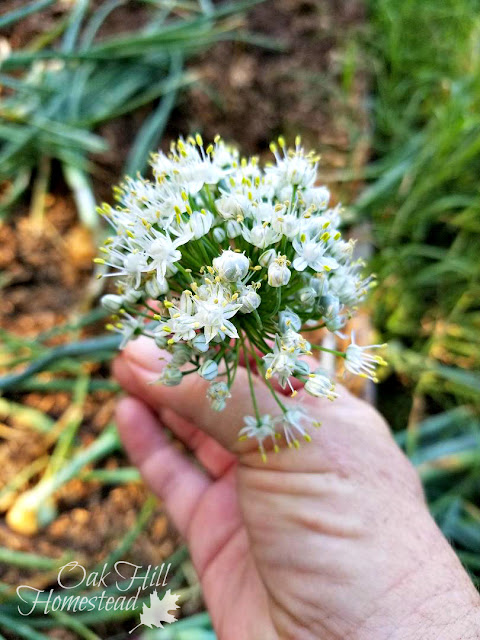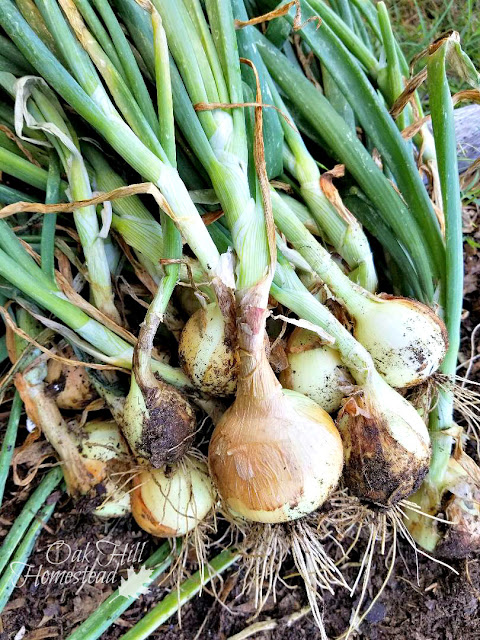Learn the best practices of harvesting, curing and storing onions from your garden in this guide. When to harvest onions, how to cure onions and tips for properly storing onions from your garden are crucial for the longevity of your onion harvest.
How to harvest, cure and store onions
The first plants to go in my garden are usually the onion plants. Not onion sets, which I planted for years and years with a lackluster harvest.
Instead, now I purchase onion plants.
A few years ago a friend gave me a coffee can full of onion transplants that she didn't have room for. There were enough to fill an entire 4x8-foot raised bed in my garden.
They grew so well and I had such a great harvest that I've never gone back to planting onion sets.
You can read more about the difference between onion sets and onion plants here: How to Plant and Grow Onions
My previous onions hadn't been much to write home about. Eventually during those previous summers I'd get a dozen small, unremarkable onions from the burlap package of sets I'd bought and planted, but that was about it.
This post contains affiliate links. Read my affiliate disclosure here.
Onions are one of the earliest plants that can be planted in the garden. Dixondale Farms, where I buy my onion plants, ships them at the right planting time for my growing zone, which is the end of January.
They usually arrive during our coldest week of the winter, so I wait a week or two to actually plant them.
The first time I ordered them and received them much earlier than I expected, I realized I was planting my onions too late in the spring. I also didn't know the difference between long-day and short-day onions, which is also crucial to success.
How to grow big onions
Onions need a lot of water, so if your garden doesn't get an inch of water per week from rain, you'll need to water them.
If you live in Oklahoma, you can check the daily and monthly rainfall totals on the Mesonet website. You may find a comparable website in other states and areas.
Onions are also heavy feeders and should be fertilized every 2-3 weeks with a high-nitrogen fertilizer such as blood meal or bone meal.
Keep your onion bed as free of weeds as possible so the onions don't have to compete with weeds for water and nutrients. Mulching the onion bed will help keep down weeds as well as hold in the moisture in hot weather.
As your onions grow, move the soil away from the bulbs. Eventually your onion bulbs should be practically "sitting on top" of the soil with just the roots underground. This little secret is a game-changer!
Some onion plants will send up a flower stalk in late spring or early summer. Not all of my plants do, but there are always a couple.
The thing is, onions that flower are bolting and going to seed, and those onions won't store well. As soon as you notice that flower stalk with the scape on it, break it off at the bottom. Don't cut it off at the top, which leaves a hollow tube for water and insects to travel down to the bulb.
If you miss some and they flower, you can simply use those onions first after harvesting. They won't store well, but they'll still taste good!
When to harvest onions
How do you know when onions are ready to pick? Onions are ready to harvest when the necks are flexible and floppy.
Not necessarily when the onions fall over, which they do because they're top heavy and their roots are short and shallow.
One morning, you'll head outside to admire your gorgeous onions, and it looks like a large animal slept in the onion bed overnight. It's a bit frightening until you remember that this means it's time to harvest!
When the leaves start to brown, begin checking the necks of your onions to see if they are still strong and firm or if they are getting thin and floppy.
Harvest onions from your garden by digging them up instead of pulling them up by the stalks.
If the neck of the onion is at all rigid, leave it in the ground a little longer. It's ok to harvest a dozen onions and leave the rest for a few more days.
When to stop watering onions
When those first leaves begin to turn brown, stop watering your onions. This allows them to dry out completely and will help them to store well.
How to cure onions
Onions need to be cured after harvesting. This allows them to dry out completely, and for the outermost layer to dry out and shrink tight to the onion bulb, forming a protective covering.
Lay onions on a screen in a single layer so they'll have airflow both above and below. An airy place in the shade is ideal. If you're curing them indoors, turn a fan on them to keep the air moving.
I set a baby gate we're not using on top of two boxes with empty space underneath, and laid the onions on top of the mesh gate. I also set up a fan to blow across them since there wasn't much airflow.
Onions need to cure for three to four weeks, until the necks have dried out completely and the skin is dry, crackly and tight around the onion bulb.
If some of your onions were harvested a bit too early and have a stiff, thick neck, or if you have some that bloomed (bolted) in the garden, use those onions up first as they won't keep as well as the others that dry out completely.
If you won't be able to use them right away, you can chop and freeze them (see the directions for freezing below).
Storing onions from your garden
When your onions are completely cured and dry (this takes about three to four weeks), cut the necks off at about an inch long (unless you're going to braid them), and cut the roots short with scissors. Brush off any soil that's still remaining.
The ideal way to store onions is to hang them in mesh storage bags, but you can also braid the stems together and hang the braids.
 |
| Harvest onions when the neck of the plant is "floppy" and flexible. |
Store your onions in a cool, dark and dry place. This might mean moving them as the seasons change.
Our garage is much too hot to store onions until winter - and when the furnace is on in the house in the winter, the cold garage is a better location.
Don't let onions freeze, though. If you're in a very cold climate an unheated garage might not be ideal after all.
Check onions often while they are in storage. If they begin to sprout, the location is too warm. If they begin to grow roots, it's too humid.
Can you store onions in the refrigerator? Yes, you can - if you have enough room!
How to freeze onions
If you have less-than-ideal storage conditions or a whole lot of onions, consider preserving them in other ways.
You can freeze onions without having to blanch them - just peel, slice or chop, and freeze.
Place the slices or chopped pieces of onion in a single layer on a baking sheet. Put the baking sheet in the freezer for a few hours, then remove the onions from the baking sheet and package them in a zipper-top freezer bag or other freezer container.
It's so easy to pull out just a handful at a time to add to a recipe, then return the bag or container to the freezer.
Gathered Goods
Onions need good airflow in order to keep well in storage. Here's what I've found works best for me: these reusable mesh storage bags.
The Chief (my husband) gave me this wonderful garden kneeler for Mother's Day - what a great help it's been! Use it as a bench or as a kneeler, and there's plenty of room in the pockets for your garden tools. It makes standing back up easy, too. (Hey, if you know, you know.)
Conclusion
For more information on choosing the right onion variety for your location, plus the difference between starting with onion seed, sets or transplants, check out this post How to Plant and Grow Onions.
If you'd like to grow perennial Egyptian walking onions, this post will get you started.
For more gardening and homesteading posts subscribe to The Acorn, Oak Hill Homestead's weekly-ish newsletter, and join me on Facebook, Instagram and Pinterest. I'd love to see you there!
~~~~~
Kathi Rodgers is the CEO and writer at Oak Hill Homestead and the host of HOMEGROWN: Your Backyard Garden Podcast. Passionate about living a simpler, healthy life, Kathi teaches new gardeners, goat owners and folks interested in living a more self-reliant life how to dig in and grow their dreams.








.jpg)









